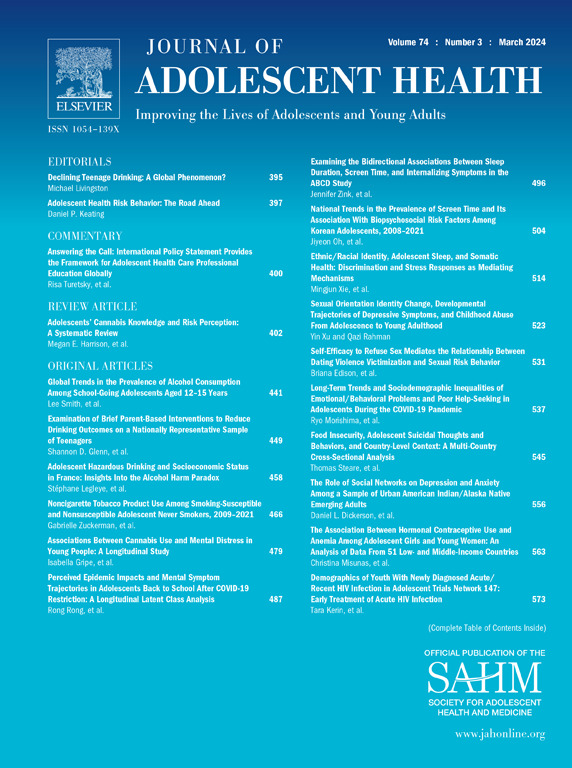青少年艾滋病毒感染者从青少年到成人护理的过渡:需求、障碍和干预措施的系统回顾。
IF 4.5
2区 医学
Q1 PEDIATRICS
引用次数: 0
摘要
15-24岁的年轻人感染艾滋病毒(YPLHIV)占全球新发艾滋病毒感染的25%以上。他们面临着从儿科过渡到成人护理的重大挑战。尽管有主要卫生组织的指导方针,但许多艾滋病毒感染者经历了非结构化的过渡,导致护理方面的差距和病毒抑制的减少。本系统综述审查了这一过渡过程中的障碍和促进因素,并评估了旨在改善向艾滋病毒感染者成人护理过渡的干预措施。本系统综述遵循系统综述和元分析指南的首选报告项目,并在PubMed, Embase和2000年至2024年的关键会议摘要中进行了搜索。我们检索了1451篇文章和17篇会议摘要,经过筛选和人工检索,得到89篇研究和10篇会议摘要。这些研究进一步分为64项描述性研究和35项干预研究,其中33项报告了结果。关于YPLHIV向成人护理过渡的文献主要探讨利益相关者对障碍的看法。不到三分之一的研究讨论干预措施,较少评估其可行性,可接受性或有效性。我们的综述强调了诸如过渡准备评估、协议、技能建设、过渡诊所、青年友好服务、流动卫生和卫生导航等干预措施。这一综述表明,未来迫切需要进行随机对照试验来评估长期结果,并确定改善YPLHIV过渡结局的有效性。本文章由计算机程序翻译,如有差异,请以英文原文为准。
Transition From Adolescent to Adult Care for Young People Living With HIV: A Systematic Review of Needs, Barriers, and Interventions
Young people living with HIV (YPLHIV) aged 15–24 years represent over 25% of new HIV infections globally. They face significant challenges in transitioning from pediatric to adult care. Despite guidelines from major health organizations, many YPLHIV experience unstructured transitions, leading to gaps in care and reduced viral suppression. This systematic review examines barriers and facilitators during this transition and evaluates interventions aimed at improving the transition to adult care for YPLHIV. This systematic review follows Preferred Reporting Items for Systematic Reviews and Meta-Analyses guidelines, with searches conducted in PubMed, Embase, and key conference abstracts from 2000 to 2024. Our search generated 1,451 articles and 17 conference abstracts, which were screened and manually searched to yield 89 studies and 10 conference abstracts. These were further categorized into 64 descriptive studies and 35 intervention studies, with 33 reporting results. Literature on YPLHIV transitioning to adult care mainly explores stakeholders' perceptions of barriers. Less than one third of studies discuss interventions, with fewer assessing their feasibility, acceptability, or efficacy. Our review highlights interventions like transition readiness assessments, protocols, skills-building, transition clinics, youth-friendly services, mobile health, and health navigation. This review reveals a critical need for future randomized controlled trials to evaluate long-term outcomes and establish effectiveness in improving YPLHIV's transition outcomes.
求助全文
通过发布文献求助,成功后即可免费获取论文全文。
去求助
来源期刊

Journal of Adolescent Health
医学-公共卫生、环境卫生与职业卫生
CiteScore
10.40
自引率
3.90%
发文量
526
审稿时长
46 days
期刊介绍:
The Journal of Adolescent Health is a scientific publication dedicated to enhancing the health and well-being of adolescents and young adults. Our Journal covers a broad range of research topics, spanning from the basic biological and behavioral sciences to public health and policy. We welcome a variety of contributions, including original research papers, concise reports, literature reviews, clinical case reports, opinion pieces, and letters to the editor. We encourage professionals from diverse disciplines such as Anthropology, Education, Ethics, Global Health, Health Services Research, Law, Medicine, Mental and Behavioral Health, Nursing, Nutrition, Psychology, Public Health and Policy, Social Work, Sociology, and Youth Development to share their expertise and contribute to our mission of promoting adolescent health. Moreover, we value the voices of young individuals, family and community members, and healthcare professionals, and encourage them to submit poetry, personal narratives, images, and other creative works that provide unique insights into the experiences of adolescents and young adults. By combining scientific peer-reviewed research with creative expressions, our Journal aims to create a comprehensive understanding of the challenges and opportunities in adolescent and young adult health.
 求助内容:
求助内容: 应助结果提醒方式:
应助结果提醒方式:


